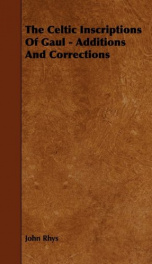celtic britain

Purchase of this book includes free trial access to www.million-books.com where you can read more than a million books for free. This is an OCR edition with typos. Excerpt from book: now come down to a time when the Romans began to acquaint themselves with the island in a very tangible fashion. Late in the summer of the year 55 B.c., Julius Caesar resolved to cross over to Britain,1 from which he understood the Gauls to have had repeated help in their wars with him. The season for waging war was, it is true, nearly over for that year, but he thought it desirable to visit the island, to see the people, and ascertain, so to say, how the land lay before h'm. So he tried first to extract information from traders about the size of the island, and the kind of people that lived there, together with their mode of warfare and manner of life; also as to what harbours they had for a number of ships of the larger sizs; but it was all in vain, and he says that no one but merchants readily crossed over, and that they only knew the coast and the districts opposite Gaul. He therefore sent Volusenus, one of his officers, out in a war-ship, to get as much information as possible respecting the coast of Britain, whence he was to return as soon as he could. In the meantime Caesar collected vessels from all parts, together with the fleet which had been engaged the summer before against the Veneti, to a port in the country of the Morini, from which the passage to Britain could be most readily made. News of this had been at once carried across, ani ambassadors from many of the states in the island came to Caesar, which shows that there was a much readier and more intimate communication between it and Gaul than Cnssar's words would have led one to anticipate. The ambas- 1 Cajsar, "De Bello Gallico," iv. 20-38. sadors promised him hostages, and the submission of their states to the Roman people. C;c;ar, after making liberal promises and exhorting them to continue of that mind, s...
Users who have this book
Users who want this book
What readers are saying
What do you think? Write your own comment on this book!
write a commentGenre
if you like celtic britain try:
Do you want to exchange books? It’s EASY!
Get registered and find other users who want to give their favourite books to good hands!





